News at the URAI
Welcome to the Fall Edition of Vital Times for Aging
Greetings from Rochester and the UR Aging Institute! We have had another successful year across all academic missions. This newsletter will share the highlights with you.

Tideswell Emerging Leaders in Aging Conference Hosted by the University of Rochester
Tuesday, December 16, 2025
 The University of Rochester was proud to host the 2025 Tideswell Emerging Leaders in Aging (ELIA) conference. Tideswell is a national leadership development program that trains a wide range of interprofessional leaders focused on the health and well-being of older people. Program activities span one year, with the anticipation that the community of leaders will remain meaningful colleagues for each other throughout their careers. This video includes interview clips from the fall 2025 Tideswell Emerging Leaders in Aging Conference in Rochester, NY.
The University of Rochester was proud to host the 2025 Tideswell Emerging Leaders in Aging (ELIA) conference. Tideswell is a national leadership development program that trains a wide range of interprofessional leaders focused on the health and well-being of older people. Program activities span one year, with the anticipation that the community of leaders will remain meaningful colleagues for each other throughout their careers. This video includes interview clips from the fall 2025 Tideswell Emerging Leaders in Aging Conference in Rochester, NY.
National Award Recipient Builds on URMC Legacy of Advancing Geriatric Care
Tuesday, October 7, 2025
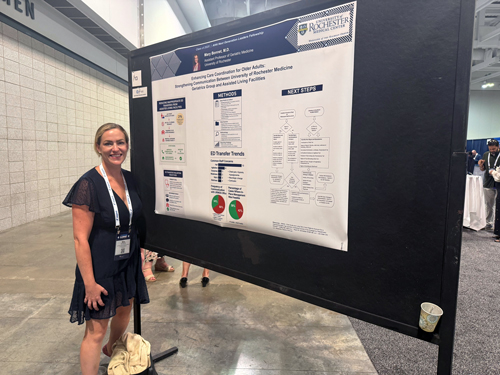 Rochester is home to some of the nation’s leading geriatrics educators, so when Mary Bonnet, MD, received the Geriatric Academic Career Award (GACA), it was the continuation of a long legacy of University of Rochester faculty to earn the prestigious award. In 2023, the Assistant Professor of Medicine in the Division of Geriatrics & Aging was one of only 26 individuals nationally to receive the four-year national K award, which is designed to support the career development of junior faculty as academic geriatricians and interprofessional educators.
Rochester is home to some of the nation’s leading geriatrics educators, so when Mary Bonnet, MD, received the Geriatric Academic Career Award (GACA), it was the continuation of a long legacy of University of Rochester faculty to earn the prestigious award. In 2023, the Assistant Professor of Medicine in the Division of Geriatrics & Aging was one of only 26 individuals nationally to receive the four-year national K award, which is designed to support the career development of junior faculty as academic geriatricians and interprofessional educators.
In the two years since receiving her award from the Health Resources and Services Administration (HRSA), Bonnet has reached several key milestones to further her own education while teaching others how to advance the field of geriatric care. In year one, she became a certified trainer for Teepa Snow's Positive Approach to Care, a method for connecting with people living with dementia that reduces agitation and increases comfort without relying as heavily on medication. “I wanted to have more tools in my toolkit, both for myself and also to share with my fellow geriatricians so we can do a better job of managing behaviors non-pharmacologically,” explained Bonnet.
Also in year one, Bonnet completed the core curriculum on medical direction through PALTmed, the Post-Acute and Long-term Care Medical Association. She was then named medical director of Rochester Presbyterian Assisted Living Homes, which operates three homes in the Greater Rochester area. Her goal is to align all assisted living health care practices with the University’s Age-Friendly Health Systems (AFHS) curriculum.
In year two, Bonnet completed a year-long fellowship through the American Hospital Association and the John A. Hartford Foundation focused on strengthening leadership skills in hospital administration. She’s now using this training to find new ways to reduce the number of assisted living residents who are sent from their homes to emergency rooms.
“The GACA has afforded me the opportunities to become a better educator in geriatric academics as well as clinical leadership,” said Bonnet. “Over the past two years, this training has not only made me a better geriatrician, but it has also made me a better educator and leader.”
This fall, Bonnet was accepted into the highly competitive Tideswell Emerging Leaders in Aging program—a year-long development opportunity that helps participants from across the country build leadership skills in clinical, research, and educational settings. Tideswell, in collaboration with the University of Rochester, will be hosting its bi-annual conference October 9-10. “I look forward to welcoming academic geriatricians from across the country to the UR campus,” said Bonnet.
“My goal is to be a national leader in geriatrics,” concluded Bonnet. “Thanks to the Geriatric Academic Career Award and my phenomenal mentors at URMC (Dallas Nelson, MD, Thomas Caprio, MD, Annette Medina-Walpole, MD, and Carol Podgorski, PhD, MPH, MS), I have a clear path to achieve this goal.”
UR Resilience Research Center (UR°C) Awarded $2M
Friday, June 27, 2025
Led by Kathi Hefner, PhD, of Geriatrics/Aging, and Jennie Noll, PhD, of Psychology, UR°C was among four transdisciplinary research centers to receive University funding. UR°C aims to identify the sociocultural factors that perpetuate stress-related health issues.
Read more about the University of Rochester Resilience Research Center
Aging Researchers Highlight Discovery of Anti-Aging Mechanisms in Bats
Wednesday, June 25, 2025
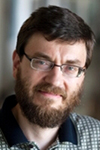
Andrei Seluanov, PhD
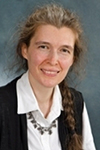
Vera Gorbunova, PhD
Researcher and co-director of the Rochester Aging Research Center Vera Gorbunova, PhD spoke to Earth.com (June 15) about her team’s discovery of how bats resist cancer and live longer because of a gene known as p53. “High levels of p53 in the body can kill cancer cells before they become harmful in a process known as apoptosis,” Gorbunova said. Andrei Seluanov, PhD, co-lead on the study, highlighted how bats’ tumor defenses work in tandem with their rapid cell growth. The discovery may inspire new therapies to target cancer and aging. “[Bats] can tolerate faster cell growth because their p53 is ready to pull the plug when things look suspicious,” he said.
Aging Experts Share Wisdom at American Geriatrics Society Meeting
Tuesday, June 24, 2025
Geriatrics/Aging faculty members and fellows had a strong showing at the 2025 annual scientific meeting of the American Geriatrics Society (AGS) in Chicago in May.
As co-PI of the Geriatrics Workforce Enhancement Program (GWEP), Thomas Caprio, MD, of Geriatrics/Aging, moderated the GWEP pre-conference session.

Lisa Vargish, MD, MS
Lisa Vargish, MD, MS, of Geriatrics/Aging, was elected by a national vote to serve as chair of the AGS Teacher’s Section. She also presented the poster “An Age-Friendly Consultative Home Visit Pilot Program Embedded in a Primary Care Practice” as part of the Presidential Poster Session.
Mary Bonnett, MD, of Geriatrics/Aging, led a Geriatric Academic Career Award Special Interest Group session.

Courtney Kramer, MD
Courtney Kramer, MD, Geriatric Medicine fellow, presented the poster “Impact of an Embedded Geriatrician in Achieving Age-Friendly Outcomes for an Academic Perioperative Medicine Clinic.”
Sarah Morgan, MD, Geriatric Medicine fellow, presented the poster “Digging Deeper into Anxiety Symptoms: A Case of Serotonin Syndrome Related to Post-Strok Neurostimulant Use.”
Kah Poh (Melissa) Loh, BMedSci, MBBCh, BAO, MS, of Hematology/Oncology, presented the poster “Strategies to Advance Research through inclusive of Diverse older Adults and Artificial Intelligence in Aging Research and Clinical Care.”

Photo caption: (left to right) Heather Lander, MD,
Annie Medina-Walpole, MD, and Jennifer
Muniak having fun at the AGS Dance Party.
Laura Robinson, MPH, program coordinator of the Finger Lakes Geriatrics Education Center, presented “Promoting Age-Friendly Care & Career Development Across Specialties: The Geriatric-Faculty Scholars Program” as part of the Education Paper Session.
Additional co-authors include Jennifer Muniak, MD, Medicine, Highland Hospital; Katlyn McBride, MD, of Geriatrics/Aging; Suzanne Gillespie, MD, of Geriatrics/Aging; Annette Medina-Walpole, MD, of Geriatrics/Aging; Dallas Nelson, MD, of Geriatrics/Aging; Dana Stanton, PAC of Geriatrics/Aging; and Lauren O’Connor, PAC, of Internal Medicine.
Caprio to Serve as Acting Chief of Geriatrics During Medina-Walpole Sabbatical
Thursday, May 15, 2025
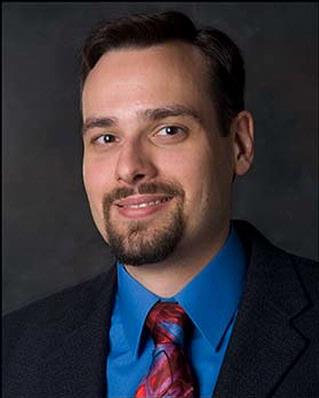
Thomas Caprio, M.D.
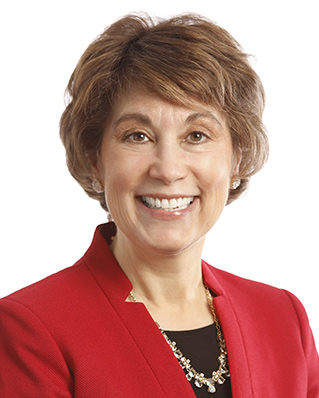
Annette Medina-Walpole, M.D.
Annette Medina-Walpole, MD, will temporarily step down as chief of the Division of Geriatrics/Aging to focus on her role as director of the UR Aging Institute (URAI). Academic geriatrician Thomas Caprio, MD, will serve as acting division chief during Medina-Walpole’s year-long sabbatical, starting July 1.
“Tom’s training and expertise span the clinical, research, and education missions, and he has proven himself as both an institutional and national leader in geriatrics,” said Department of Medicine Chair Ruth O'Regan, MD. “His experience and expertise make him a great fit for this position, and I look forward to working with him over the next year.”
Caprio is a geriatrician and hospice/palliative care physician, serving as chief medical officer of UR Medicine Home Care, medical director of UR Medicine Hospice, and professor of Geriatrics, Dentistry, Psychiatry, Public Health Sciences, and Clinical Nursing. He also directs the Finger Lakes Geriatric Education Center.
Caprio leads research that improves care delivery for older adults. He studies how interdisciplinary approaches, such as geriatrics-related educational programs for health care professionals, can improve care and outcomes for aging patients with complex needs. He also investigates ways to improve health care policies affecting home care, hospice services, and long-term care.
As acting chief, Caprio will oversee the division’s education, research, and clinical care programs and over 45 faculty members who provide care for thousands of older adults each year. He will maintain the division’s role in shaping the future of healthcare delivery to older adults in the region.
“I am deeply honored to take on this role and continue to support the University of Rochester’s national reputation for excellence in geriatrics," said Caprio. “I’m excited to continue building our collaborative clinical teams as we provide age-friendly care throughout our health system and advocacy for funding to support our ongoing work in research and education.”
Over the next year, Medina-Walpole will develop a five-year strategic plan for the URAI that aligns with UR Boundless Possibilities and URMC strategic plans.
The URAI integrates aging-related expertise in research, patient care, education, and community outreach across the University to empower older adults to age with vitality. Since its inception in 2019, the institute has helped researchers procure over $40 million in new funding, developed strong collaborations across the University and community organizations, established a training grant in Alzheimer’s Disease, and led URMC’s Age-Friendly Health Care System transformation.
“The UR Aging Institute has had an incredibly successful start,” said Medina-Walpole. “Now, it’s time to bring the institute to the next level, in line with other premier national aging institutes. My academic leave will focus on establishing future directions and priorities that build on our mission.”
Medina-Walpole will visit renowned aging programs at other prominent academic institutions to draw inspiration from their operational models. She will also conduct a listening tour across the University to identify new opportunities for collaboration across the URAI. A strategic planning taskforce and an external advisory board will help develop and evaluate the new URAI strategic plan.
Medina-Walpole plans to resume her role as Geriatrics/Aging chief and clinical duties on July 1, 2026.
Vera Gorbunova Speaks at Global Healthspan Summit
Tuesday, February 18, 2025
 Vera Gorbunova, PhD, member of the UR Aging Institute, was invited to speak at the Global Healthspan Summit in February, an event that brought together the world's leading aging researchers. Dr. Gorbunova participated in a panel discussion on comparative biology and spoke about her research that identifies commonalities among humans and long-lived species like whales.
Vera Gorbunova, PhD, member of the UR Aging Institute, was invited to speak at the Global Healthspan Summit in February, an event that brought together the world's leading aging researchers. Dr. Gorbunova participated in a panel discussion on comparative biology and spoke about her research that identifies commonalities among humans and long-lived species like whales.
“Wild animals need to stay extremely healthy to live long otherwise they would not survive,” said Gorbunova. “So those adaptations that we discovered can be directly targeted to improve [human] healthspan.”
More than 2,000 people attended the Summit, which helped researchers learn about scientific breakthroughs, form strategic partnerships, and connect with potential investors to improve healthspan for future generations.
New Study Links Mystery Mutations to Kidney Disease, Unlocking Potential Therapies
Tuesday, February 11, 2025
Hongbo Liu, Ph.D., assistant professor of Biomedical Genetics, and researchers from the Perelman School of Medicine at the University of Pennsylvania pooled 32 types of genetic data to link mutations in non-coding (junk) DNA to their functions. Published in Science, “this paper solves a vexing puzzle that has plagued genetic research for decades,” said Hartmut “Hucky” Land, chair of Biomedical Genetics at URMC.